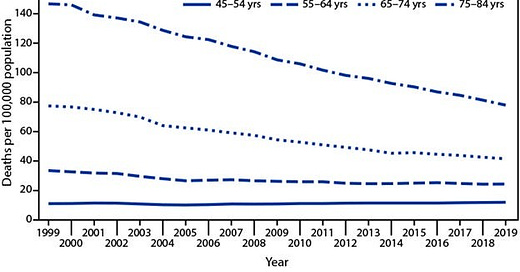Everyone deserves sedation for colonoscopies, but healthy adults rarely need an anesthesiologist
January 30, 2024
Source: Morbidity and Mortality Weekly Report, 2021 LINK
Colonoscopies can find early cases of colorectal cancer, and the chart above shows this screening is likely responsible for the decrease in deaths from colorectal cancer over the last two decades. However, there is a controversy brewing in New England where a regional health plan announced that it will not pay for monitored anesthesia care (MAC- care provided by anesthesiologists) for screening colonoscopies.
This new policy applies to adults only. High risk patients with relevant medical comorbidities would still be able to have coverage for anesthesiology care, which would require providers to get approval for these services. All members having colonoscopies will clearly be able to get sedation delivered by the gastroenterologist performing the colonoscopy. This new policy does not apply to other procedures, such as endoscopy of the biliary (liver)ducts.
Colonoscopies can be painful, and almost everyone getting a colonoscopy gets some sort of sedation. Gastroenterologists can administer conscious sedation, usually with a drug in the Valium class and a narcotic. Patients remain conscious but will usually remember little or nothing of the procedure. This new policy is trying to steer more patients to this kind of support.
Anesthesiologists can administer deeper sedation (unconscious sedation). This might sometimes increase patient comfort, though it increases cost. There is no compelling evidence showing that colonoscopies with anesthesiologists are more complete (i.e. have lower rates of missed polyps or cancers) or patients are more satisfied.
The services of an anesthesiologist increase the cost of colonoscopies, and many people might get ‘surprise bills’ if the anesthesiologist is out of network. Before the No Surprises Act, the median out of network anesthesiology fee was $488, and 12% of all colonoscopies included surprise bills. The No Surprises Act could lower the total allowed from out of plan anesthesiologists.
This policy is, not surprisingly, opposed by anesthesiologists. Many gastroenterologists also oppose this policy, as having an anesthesiologist arrange sedation frees them to perform more procedures during each session.
Implications for employers:
Sedation delivered by anesthesiologists given routinely to those getting colonoscopy who are at low risk of complication is a low value service.
Efforts to cut back on low value services help control health care costs, and make sure that we can offer affordable health insurance premiums and a high level of subsidization for high value services.
I hope employers will support carriers which put into place policies to decrease the utilization of low value services.
Here’s a link to a post on colorectal cancer screening from last year. (Scroll down to item 2)
Thanks for reading. You can find previous posts in the Employer Coverage archive
Please “like” and suggest this newsletter to friends and colleagues. Thanks!
Wednesday: Artificial intelligence to augment imaging could be pricey





